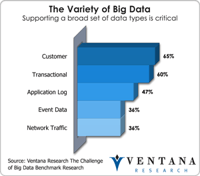Read More
Topics:
Big Data,
Sales Performance,
Social Media,
Mobile Technology,
Vitria,
IT Performance,
Operational Performance,
Business Analytics,
Business Intelligence,
Business Performance,
Cloud Computing,
Complex Event Processing,
Customer & Contact Center,
Financial Performance,
Governance, Risk & Compliance (GRC),
Information Applications,
Information Management,
Location Intelligence,
Operational Intelligence
Ventana Research was the first analyst firm to cover operational intelligence, and a while back I wrote how the products of Vitria support proactive customer service by using event data to anticipate likely impacts of operation issues on customer service. Our research into the use of analytics shows that while more mature companies have begun to adopt OI, they are mainly early adopters. In an effort to speed up adoption, Vitria has developed what it calls operational intelligence apps and it...
Read More
Topics:
Predictive Analytics,
Customer Analytics,
Customer Experience,
Social CRM,
Speech Analytics,
Vitria,
Voice of the Customer,
Operational Performance,
Analytics,
Cloud Computing,
Customer & Contact Center,
Customer Service,
Information Applications,
Operational Intelligence,
Call Center,
Contact Center,
Contact Center Analytics,
CRM,
Desktop Analytics,
Text Analytics
Vitria is one of a small group of vendors offering a type of analytics called operational intelligence. The term is not widely known, although Ventana Research has defined and tracked this market for many years and researched. We define operational intelligence (OI) as “a set of event-centered information and analytics processes operating across the network that enable people to take effective actions and make better decisions.” For its part Vitria defines OI as “a new type of real-time,...
Read More
Topics:
Predictive Analytics,
Social Media,
Customer Analytics,
Customer Data Management,
Customer Experience,
Customer Feedback Management,
Social CRM,
Speech Analytics,
Vitria,
Voice of the Customer,
Operational Performance,
Analytics,
Business Mobility,
Cloud Computing,
Customer & Contact Center,
Customer Service,
Call Center,
Contact Center,
Contact Center Analytics,
CRM,
Desktop Analytics,
Text Analytics,
Unified Communications,
Workforce Management
In my writing and speaking, I try to avoid “market babble,” which numbs ordinary readers with technology buzzwords and three-letter acronyms. Lately I have been accused of overusing the phrase “interaction-handling processes,” which some people have taken as an instance of market-speak. So I’ll explain what I mean by it. It has to do with contact center agents – or customer service representatives, if you prefer – trying to resolve customers’ issues. When handling a call, for example, this...
Read More
Topics:
Vitria,
Operational Performance,
Complex Event Processing,
Operational Intelligence











